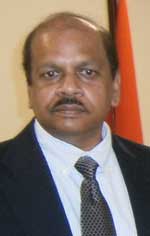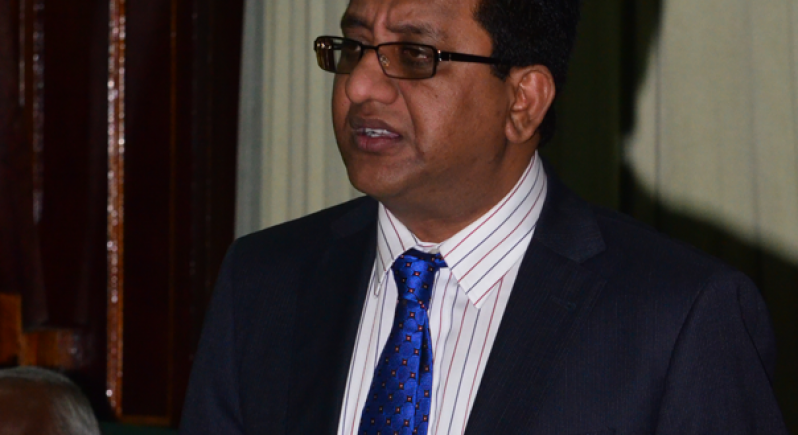Regional stakeholders hold same position on AML/CFT Bill – Dr. Ganga
THE call by the Caribbean Association of Banks (CAB) on Monday for Guyana to pass the Anti-Money Laundering and Countering the Financing of Terrorism (AML/CFT) (Amendment) Bill is a reiteration of the same message from other regional stakeholders.
This was according to Governor of the Bank of Guyana, Dr. Gobind Ganga, who also told the Guyana Chronicle that the Caribbean Community (CARICOM) Central Bank Governors made the same call at a meeting in July.
“The passage of the AML bill is not only about Guyana, but also about the international financial sector as a whole in order to protect all financial systems, within the region, from ongoing money laundering and terrorist financing risks. We are only as strong as our weakest link” – CAB
“At the 42nd Bi-Annual Meeting of CARICOM Central Bank Governors, this was the call,” he said.
The CAB in its statement said, “The passage of the AML bill is not only about Guyana, but also about the international financial sector as a whole in order to protect all financial systems, within the region, from ongoing money laundering and terrorist financing risks. We are only as strong as our weakest link.”

LOCAL CALLS
Additionally, in January the Bankers Association in Guyana brought to the attention of the Administration, problems being encountered as a consequence of this country being blacklisted by the Caribbean Financial Action Task Force (CFATF).
After failing to comply with CFATF’s requirements, Guyana was blacklisted regionally and referred to FATF last November.
The combined political Opposition had voted down the AML/CFT (Amendment) Bill last November 7, ignoring pleas from the Government to support the bill.
As a result of missing that deadline, the CFATF issued an adverse public statement, calling on member states which fall under its jurisdiction to take the necessary measures for protecting themselves from the risks that Guyana poses, as a potential money-laundering and terrorism haven.
Consequently, several Central Banks in the Caribbean issued advisories, warning their respective commercial sectors of Guyana’s current position and calling on their constituent members to protect themselves from whatever risks are emanating from Guyana.
A month later, the Guyana Bankers Association reiterated its call for action on the critically important Bill, with the Association’s Head, Mr. Amit Kumar, stressing the need for a strong AML/CFT legislative framework as fundamental to their continued functioning.
According to Kumar, in a prior comment, the stated implications of the non-passage of the Bill, include the fact that:
* Bank-to-Bank relationships and business between Guyana’s commercial banks and foreign banks may be halted for an unpredictable amount of time. This includes relationships with commercial banks in sister CARICOM territories. The foreign banks may opt not to do business at all with Guyana’s banks if Guyana’s AML/CFT laws do not meet the standard required by the requisite AML/CFT bodies (in this case the CFATF) and are thereby inadequate to provide those institutions with the requisite level of comfort to conduct business with local banks;
* Adequate access to foreign exchange in a timely manner may be affected;
* Members of the public may experience difficulty in sending or receiving money from overseas through commercial banks and cambios if the correspondent banking relationships with foreign banks are jeopardized, as there may be no bank-to-bank relationships to foster this activity;
* Payments in a timely manner to persons overseas for provision of goods and services may be affected, and
* The “Letter of Credit” issued by banks in Guyana may not be accepted by overseas banks, resulting in numerous problems and complications when conducting business with these entities.
TOO MUCH TO LOSE
Dr. Ganga maintains that Guyana cannot afford to be labelled by the Financial Action Task Force (FATF) as a country without strong AML/CFT legislations. “We have too much to lose. This bill should have been passed a long time ago,” he stressed.
The BOG Governor was part of a high-level team, led by Attorney-General (AG), Mr. Anil Nandlall, which met with the Americas Regional Review Group (ARRG) in Miami on September 29, as mandated by FAFT.
Following that meeting, Guyana has now embarked on a process of putting in place alternatives to address the technical deficiencies in its existing legal and financial legislative architecture for the assessment of FATF.
“Were we able to pass the Bill then we would not have had to go through this process, but because we did not pass that Bill we now have to look at alternative mechanisms to satisfy the technical requirements,” the AG said in a comment on the current state of affairs.
FATF has appointed a special body comprising representatives from the Americas to work with Guyana for the purpose of making a presentation of Guyana’s case to that body’s plenary meeting on October 18-24 in Paris. This high-level team will send its work plan to Guyana along with other issues that they may identify for addressing for consideration by FATF.
Essentially, the final report that will be prepared by Guyana under the supervision of the AARG will be Guyana’s case to FATF at its October plenary.
(By Vanessa Narine)




.jpg)










